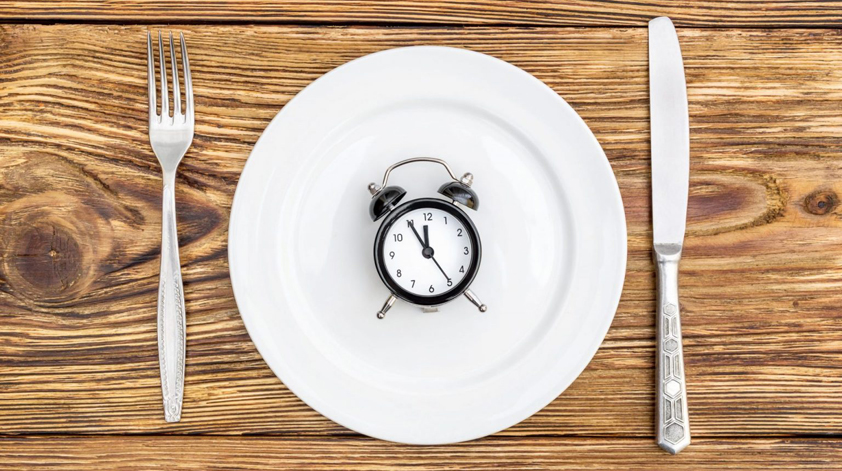You know your diet has a lot to do with your weight and body composition.
When it comes to weight loss, and maintaining that weight loss, the number one strategy people use is modifying food intake.
Most people emphasise their food choices, and that’s definitely encouraged. Watching what you eat is important.
But meal frequency is another dietary variable that often gets overlooked. Hand-in-hand is meal size. How do those qualities of your meals affect your weight?
In athletics, research has established timing and quantities for food intake that maximize performance. But people just trying to shed a few pounds are often less sure of how to optimize their meals for weight loss.
Over 50 years ago, research suggested that eating frequent, smaller meals was associated with lower weight and better metabolic health. More recently though, that notion has been under substantial speculation.
So which is better for weight loss? Frequent, smaller meals throughout the day? Or just a couple larger meals at regular times during the day?
Before figuring out how to optimize your meals for weight loss, let’s first take a look at some background knowledge on how your body handles meals, and why their frequency and size matters.
THERMIC EFFECT OF FOOD
Meal digestion is a complicated process. Luckily, for this article you just need to focus on a few basics to understand why the frequency and size of your meals can impact your weight.
Each time you eat a meal, your metabolic rate increases. That’s because all the processes for digestion and absorption require energy and blood flow.
Since increasing your metabolic rate means expending calories and generating heat, this phenomenon is called the ‘thermic effect of food.’
On average, your metabolic rate increases by 25% after a meal. Of course, that number varies with factors like hormone levels, circadian rhythm, and weight fluctuation.
But a substantial contributor to variation in the thermic effect of food is the size of the meal. Larger meals require more energy to power digestion, so they increase metabolic rate more than smaller meals.
DISPELLING COMMON BELIEFS
There was a famous study in the 1960’s study that showed frequent, smaller meals were better for maintaining a lower weight? It’s time to dispel that common belief.
When people try losing weight on a low calorie diet, they often think that spreading their calories throughout the day will keep their appetite down and make it easier to stick to the diet.
That’s not necessarily true. Preliminary research shows that high eating frequency (8x / day) results in more hunger and desire to eat, and less fullness than low eating frequency (3x / day).
Why? Unfortunately, the study wasn’t designed to find out. But it may have had something to do with the differences in how larger and smaller quantities of food are digested and their effects on gut hormones and satiety.
In any case, that study is only one piece of the puzzle. Appetite matters, but the result we’re after is improved body composition.
In a two month trial, eating one meal per day resulted in a greater loss of fat mass than eating 3 meals per day. While the actual number of meals per day in this study was different than others you’ve read about, this result shows that eating fewer meals per day can help you achieve a better body composition, especially in the short-term.
My advice is always to avoid making judgements based on a single study though.
EVIDENCE FROM LARGER STUDIES
Epidemiological research on meal frequency shows that more frequent eating is associated with higher weight.
Since epidemiological data is usually observational and collected on large groups, it’s not always useful for explaining why things happen. But, it’s a great way to get an idea of what works in general and what doesn’t.
In a study of almost 20,000 people, researchers found that men and women were about 1.5 times as likely to be overweight or obese if they ate five or more times per day (compared to three or fewer times).
While that doesn’t explain why more frequent eating was associated with higher weight, it’s important to note that this was true even for people whose eating occasions were classified as ‘snacks.’ The high frequency eaters weren’t all wolfing down five full meals a day.
The evidence from this type of research becomes a bit stronger when participants are followed over time. That way, it’s possible to observe changes, rather than simple associations at a snapshot in time.
In a study that followed thousands of men over a decade, researchers found that those who ate more than 3 meals per day were about 15% more likely to gain 11 pounds over the decade.
It’s tough (or impossible) to tell from these studies whether eating fewer meals will directly lead to weight loss or lowering chances of weight gain, but you can conclude that people who eat less frequently tend to keep extra weight off.
Also keep in mind that it’s not the number on the scale that truly matters. Body composition is far more important than weight, since it’s possible to be ‘heavy’ but packed with muscle. On the other hand, you want to avoid being ‘skinny fat.’
Clinical studies are helpful for figuring out whether you should actually follow a strategy. Keep reading to find out how meal frequency affects your appetite and body composition.
WHY MEAL FREQUENCY MATTERS
So, why is it that lower meal frequency seems to be better for weight and fat loss than eating throughout the day?
The answer has to do with the physiology of your meal intake. In another study that found eating twice (rather than six times) per day is better for weight loss, the gut hormone response to lower meal frequency meant subjects were more likely to eat breakfast. More on that soon, but for now just know that eating breakfast may help you achieve weight and fat loss.
Research also shows that fewer eating occasions throughout the day results in greater production of one of the key hormones that increases satiety after a meal, PYY. Higher protein intake was also associated with greater satiety. That means it should be easier to stick with a low calorie diet if you eat your allotted calories in just a few meals per day. Make sure to get your protein requirement in too!
BREAKFAST MATTERS
Lower meal frequency isn’t the only strategy you should consider to aid your body composition goal. You can combine meal frequency with other habits to boost your chances even more.
Many people swear by eating breakfast as a key strategy for losing and maintaining weight loss.
But what does the science say? In people who have some weight to lose, and especially those individuals who don’t normally eat breakfast, starting the day off with a healthy meal can help you lose weight.
Making breakfast a high protein meal could also contribute to lowering your fat mass. But the common theme these studies share is that getting your calories earlier in the day is best for fat loss.
ENERGY DEFICIT IS KING
If you’re trying to lose weight or fat, it can be appealing to go after strategies like fasting or adjusting meal frequency. But keep your eye on the prize, and recognize that the most important step you can take is a moderate reduction in calorie intake.
To lose weight, you need to be in an energy deficit. No amount of adjusting your meal frequency can change that.
Here’s some evidence to support that: on the same amount of energy deficit, research participants lost the same amount of weight and fat on a high meal frequency plan as a low frequency plan.
That’s not to say meal frequency doesn’t matter; it does, as you’ve seen throughout this article. Under a low calorie diet, people eating two meals per day lost more weight than those eating six per day. But without an energy deficit, neither high or low frequency eating groups lose weight.
Remember that there’s no ‘magic pill’ solution to achieving your body composition goals. Only dedication and hard work will get you there. But if you’re looking for a bit of a leg up, consider maximizing your dietary strategies.


